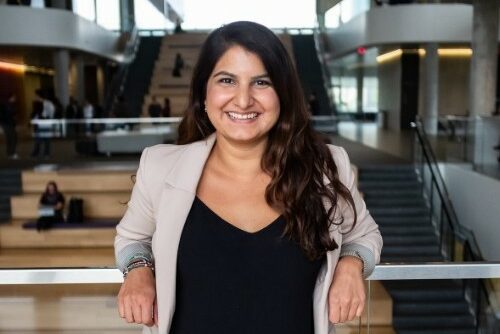Communities like Halcyon are building blocks not only for our entrepreneurial environment, but also for society.

“My parents are from India and Tanzania, and I had the opportunity to travel back to their hometowns when I was about eight years old.
I just remember really recognizing the differences between where they grew up and the opportunities that a lot of my female cousins had in comparison to what I was able to do in Canada as a girl, and just having a very stark realization of how different my life was and how privileged I was at such a young age.
That memory has sort of stuck with me throughout my life, especially as I’ve embarked on this journey to travel back to East Africa and reconnect with my roots and provide opportunities and support to women and girls like me who haven’t had the same opportunities.
I started my career working at healthcare companies in Canada and the UK. When I was in the UK, I was fortunate to take on a role as their CSR lead, and that gave me a lot of exposure to some of the areas that I was passionate about in women’s health and global health, and I was able to support some of the work that they were doing in South Africa. During that time, I realized that I was much more passionate about that work than I was doing my day job, so I decided to quit my cushy job in London, go back to school, and try and pivot my career into the global health space.
I never thought I would start a company, but I ended up interning at an organization called Jacaranda Health in Nairobi, Kenya while I was in grad school. That gave me exposure not only to what it was like to live and work in Kenya, but also what it was like to work at a smaller startup, the exposure and field level impact that we were making, and how it felt much more tangible than some of the work that I was doing very far away from the problem in the UK.
I also had the opportunity to work on a breastfeeding-related initiative during my time there. I had conversations with hundreds of moms about their breastfeeding experiences where I learned about the lifesaving powers of breast milk, but I also realized that many women struggle a lot with the breastfeeding experience, not only because it’s not necessarily a natural skill that you just know how to do when you give birth—it’s actually a learned skill—but also because many of these women were returning to work after giving birth and they didn’t have the practical tools that were necessary to work and breastfeed.
It was sort of problematic that we were lecturing women on what they should be doing when really, they had no practical way of implementing our advice. And so, I realized that we’ve spent a lot of time on education and awareness and not nearly enough time on providing practical tools and support. This was the spark of the idea for Maziwa, and then I spent the next year finishing grad school, traveling back to Kenya several times to explore this idea further, co-create a solution with moms, and eventually launch the idea.
As we were starting to scale our organization after we had launched the product, we were looking at different opportunities to drive business development and market access. I think the most valuable part of the Halcyon experience was being able to live in D.C. and gain exposure to a lot of the partners and funders in the global health space that exists in the DMV, as well as connect with a large community of African entrepreneurs.
The entrepreneurs who are focusing on social impact driven problems, whether it’s health care, financial inclusion, agriculture, climate change—all the key challenges that the world faces—are working on really difficult problems. And so, any communities and any environments like Halcyon that facilitate that support and that generate entrepreneurial community are so crucial and critical to our growth and to our ability to amplify our impact in the various areas that we’re focused on.
We all really appreciate all the supporters that have been a part of Halcyon so far, and anyone who’s considering it should know that they’re making a really important impact not only the lives of us as entrepreneurs, but a lot of the people who are really impacted on a daily basis with our work.
Our vision is to reach over 500,000 women and children with our Community Breastfeeding Ambassador Program and our Wema breast pump. We’re looking to launch additional products and services to our network and across several new markets in East Africa, and eventually across the continent. By 2028, we not only aim to reach half a million women and children, but also achieve $10 million in revenue through our products and services and break even on our overhead costs.
So, there’s a lot of progress to be made, and we’re really excited to be solving the problem for some of the most important but often marginalized members of our society—working mothers in developing markets—by offering them the tools and resources they need to make their lives easier.”